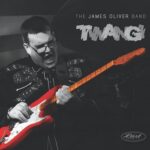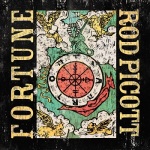 “Twang”; simple, it does what it says on the tin. OK, front cover, but you know what I mean and, actually, it does quite a lot more than it says on the tin. The twang is certainly present, but there’s a lot more to this album than Dick Dale influences. “Twang” is much more than surf or surf-punk. James Oliver pulls in many more guitar influences including Elmore James, Chuck Berry, Link Wray, Mick Green, Wilko Johnson and George Thorogood. And that’s before we even mention the legendary Dave Edmunds, whose collaborator Paul Riley mixed “Twang”. If you want another Welsh guitar connection, James is from Blackwood, home of the Manic Street Preachers – all part of the service.
“Twang”; simple, it does what it says on the tin. OK, front cover, but you know what I mean and, actually, it does quite a lot more than it says on the tin. The twang is certainly present, but there’s a lot more to this album than Dick Dale influences. “Twang” is much more than surf or surf-punk. James Oliver pulls in many more guitar influences including Elmore James, Chuck Berry, Link Wray, Mick Green, Wilko Johnson and George Thorogood. And that’s before we even mention the legendary Dave Edmunds, whose collaborator Paul Riley mixed “Twang”. If you want another Welsh guitar connection, James is from Blackwood, home of the Manic Street Preachers – all part of the service.
The album’s opener, “American Cars”, is a humorous swipe at the role of the car in rock ‘n’ roll music and the conspicuous absence of the American models in the Welsh Valleys, in a similar vein to Billy Bragg’s “A13, Trunk Road to the Sea”, but with more guitar; loads more guitar and plenty of piano as well. It sets the scene for the album; the musicianship is cracking, it’s one hundred miles per hour and there’s a lot of humour running through it.
Did someone mention Link Wray? The instrumental, “The Missing Link” is the surf equivalent of Stevie Ray Vaughan’s version of “Little Wing” as James runs through the various techniques of surf guitar, demonstrating his complete mastery of the genre (and more besides); and just like SRV’s piece, it’s a masterclass.
There are a couple of Big Joe Turner covers, “TV Mama” and “Honey Hush”, where James pulls in a few other references as well; “TV Mama” hints at Dave Edmunds’ 1970 No. 1 cover of the Dave Bartholomew classic “I Hear You Knocking”, while “Honey Hush” hints at a Phil Spector production, which Dave Edmunds also emulated for a while in the early seventies.
The James Oliver Band is much more than a simplistic tribute to sixties surf music. The stylings are complex; there are multiple tempo and rhythm changes throughout, particularly on “The Missing Link” and “Clean House” and the album’s closer, the Dick Dale classic “Misirlou” winds down with a bottom E string being gradually de-tensioned as the tune winds to a close. These are all examples of a musician with technical expertise and a clinical understanding of how a song is put together.
With the death of Cavan Grogan earlier this, maybe it’s time for James Oliver to make his breakthrough; after all, sixty-five years down the line all Chuck’s children are still out there playing his licks.
“Twang” is out now via The Last Music Company (2REV101).
Here’s a little video clip for you as well:
 So, where are the likely places to hear someone playing a Telecaster? On a British nineties indie record maybe; the black Tele was the indie guitar-slinger’s weapon of choice. On a country record maybe; James Burton has a couple of signature models. Springsteen? Albert ‘master of the Telecaster’ Collins? How about on a Europop or techno/folk album (whichever description you prefer) by a French artist writing in English and inspired by Tim Burton and David Lynch? No, wouldn’t have been my first choice either, but that’s exactly where we find this particular Telecaster doing its thing.
So, where are the likely places to hear someone playing a Telecaster? On a British nineties indie record maybe; the black Tele was the indie guitar-slinger’s weapon of choice. On a country record maybe; James Burton has a couple of signature models. Springsteen? Albert ‘master of the Telecaster’ Collins? How about on a Europop or techno/folk album (whichever description you prefer) by a French artist writing in English and inspired by Tim Burton and David Lynch? No, wouldn’t have been my first choice either, but that’s exactly where we find this particular Telecaster doing its thing.
But this is about more than Telecasters. Talisco is based in Paris, he’s already well-known across mainland Europe (“Run” was released in France in 2014) and this is the push to crack the UK market. He’s only started singing relatively recently (if my translation of his French Wikipedia page is accurate) and that’s a huge surprise, because his voice is powerful and distinctive with a strong resemblance to Freddie Mercury on the first two Queen albums.
A couple of songs on the album, the opener “Your Wish” and “The Keys” might even sound a bit familiar because they’ve been used to soundtrack ad campaigns in the US and Europe. They’re both a bit lively and, along with “In Love” which separates them on the album, not too representative of the work as a whole.
“Follow Me” has a very sixties, clean and heavy on the reverb, guitar sound while “Sorrow”, with its damped guitar riff hints at the dynamics of Link Wray’s “Rumble”. The early Queen references shine through on the multi-tracked vocals of the acoustic “So Old” and the piano and acoustic guitar arrangement of the album’s closer “Lovely”. The clean Telecaster intro of “Glory” has more than a hint of Mink de Ville’s “Spanish Stroll” and the intro and riff from “Everyone” is pure Ennio Morricone.
“Run” is an album packed with ideas and invention, striding effortlessly across musical styles from various eras with verve and panache. And Talisco does have a great voice. For my money, some of the more uptempo songs opening the album are a bit overdone, and overall it lacks a bit of focus, but it’s certainly an interesting listen and a pretty good hint that there’s much more to come.
“Run” is out in the UK on April 8th on Roy Music (ROY 60).
 I think we need to introduce a new way of evaluating Country and Americana albums. The five star system’s all very well but I think we need another measure. I’m thinking of something like the Kimbrough Count; if Will Kimbrough plays on the album then it’s worth listening to. It certainly worked last year with his appearances on albums by Dean Owens and Sam Lewis, and he shows up again here on Rod Picott’s seventh album “Fortune”, but this is a very different proposition to the albums by either of those artists.
I think we need to introduce a new way of evaluating Country and Americana albums. The five star system’s all very well but I think we need another measure. I’m thinking of something like the Kimbrough Count; if Will Kimbrough plays on the album then it’s worth listening to. It certainly worked last year with his appearances on albums by Dean Owens and Sam Lewis, and he shows up again here on Rod Picott’s seventh album “Fortune”, but this is a very different proposition to the albums by either of those artists.
Rod Picott’s songs are intensely personal, zooming in on the lives of ordinary people (Rod included) and everyday events, and delivered in a gruff baritone that often sounds on the point of cracking, but never actually does. More often than not, he performs with just his own acoustic guitar for backing, but, on “Fortune”, he’s added a smattering of musicians including Will Kimbrough and Neilson Hubbard to create a sound that’s still sparse, stark and sometimes downright menacing and intimidating. It’s still a fairly minimal soundscape but it reinforces the powerful lyrics which are poetic but never overblown.
“Uncle John” is slightly untypical in that it deals mainly with family and society rather than personal matters, but the instrumentation is unsettling with detuned guitar, clipped notes, harmonics, heavy reverb and a sound somewhere between Dick Dale and Link Wray all underpinning a story of an outsider woodsman who pays the ultimate price for stepping outside society. The two lines ‘Drinks his beer from a can cause bottles break, Nine fingers from one mistake’ paint a graphic and economic picture of the lifestyle and its dangers, while the closing lines (along with the chorus) imply his death without actually making the statement.
The themes of the songs are mainly personal (although “Jeremiah” is written from the point of view of a woman hearing about the death of a soldier she loved), but it’s the moments when Rod steps back from dealing with raw emotion to singing about more general themes, particularly “Uncle John” and the moodily magnificent “Drunken Barber’s Hand” that the album really starts to soar. The album’s full of powerful, gut-wrenching songs that evoke the spirit of heartland America with imagery and playing that are equally powerful and simple. 2016’s looking good already.
“Fortune” is released in the UK on Friday January 15th on Welding Rod Records.


